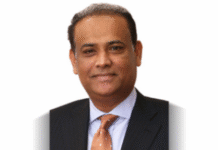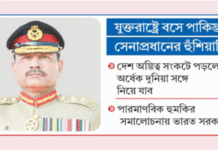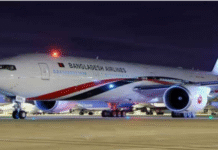Capt. Hussain Imam
- 23 November, 2022
- As indicated by Election Commissioner Anisur Rahman, the next general election of the country is going to be held on the first week of January 2024. In little over a year, the people of this country will have a chance to elect a new government. Whether the Awami League will retain power or some other party will take over, only time will say.
The upcoming election will, in fact, be the biggest challenge for the Awami League, not for the BNP because the Awami League is in power and the main issue of the election will be the economy of the country. In the wake of a prolonged corona pandemic and the ongoing war in Ukraine, the world is going through an economic recession. Rising inflation, record high even in some of the developed-countries, and the abnormal rise in the cost of living are making life difficult even in the most developed countries.
Bangladesh is obviously not an exception to it. The economic situation in the country is in dire straits, to say the least. Prices of almost all the items of daily necessity including rice, sugar, lentil, wheat and vegetable oil have gone up by 30 to 100 percent. In one hand, the cost of living has increased substantially. On the other hand, the real income of people has declined. People are literarily reeling with the burden of the disproportionately high cost of living.
Livelihood is the life and death issue for the ordinary people of the country. The political parties, especially the party in power, will have to face the voters with multiple questions relating to their livelihood. The voters will ask for a satisfactory solution to their financial crisis. They will ask for baby food for their babies. They will ask for jobs for their grown up children. They will ask for fertilizer, seeds, pesticides and diesel at a cheaper rate to cultivate their land. After all, it is the food that matters most. The Awami League, as the party in power has to deal with all these pertinent issues if they have to convince the voters to re-elect them for another term.
The UN world Food Program (WFP) and Food and Agricultural Organization (FAO} have already warned of an acute global food crisis leading to famine in many countries, especially in the third world countries including Africa by 2023, mainly for two reasons: One is the Ukraine war disrupting supply chain across the world, the other is the impact of climate change curtailing production of food grain due to extreme weather conditions.
Prime Minister Sheikh Hasina, in her address to a Jubo League rally at Suhrawardy Udyan on Friday, 11 November, 2022, has assured the public that there will be no famine in Bangladesh in the near future. They have enough food grain in stock and they are importing more to ensure food security. The voters would like to rely on her assurance.
In the circumstances, as highlighted above, the next general election will not be a cake walk for any political party, be it in the position or in the opposition. Their election manifestoes will have to address all these critical issues. They have to tell the public how they are going to solve the country’s multidimensional problems when they are in power. They have to say how they are going to address the perennial issues like money laundering, corruption and loan default.
For the BNP, spending time, money and energy in the name of movement for a nonpartisan caretaker government rather than concentrating more on how to contest the Awami League in the upcoming election, taking advantage of the prevailing socio economic crises in the country, will probably be unwise. Yes, their movement for a caretaker or neutral government may appear to be gaining momentum for a while but not for long. In the end, the reason for their boycott of the election on caretaker government issue, if they do so, may not be an acceptable proposition even to their own workers, let alone the public.
For the Awami League-led government of Prime Minister Sheikh Hasina, the positive aspect is its remarkable performance in growing food grains, fish and vegetable, increasing production capacity of electricity and construction of mega projects like Karnafully under water tunnel, Dhaka metro rail, Dhaka– Chittagong Elevated Express Way, Ruppur Nuclear power plant, Matarbari Thermal Power Plant, Payera sea port and more importantly, the Padma Multipurpose Bridge, not to mention about the efficient handling of the covid-19 pandemic.
Ironically all these phenomenal achievements may not be enough to convince the voters to vote for them because the factors that will go against them are no less significant. First of all, they are the incumbent government. Secondly, they have to face the opposition in an election at a time when the country is going through a period of deep financial crisis. They have to embark on an election campaign at a time when the country’s foreign exchange reserve is likely to go down to around $ 30 billion from $46.46 billion (Oct. 2021), when the country’s remittance as well as export-earning will continue shrinking.
Nobody knows for sure, how far the country’s economy shall downturn by the time the voters will be queuing at the polling booths to choose their next government. They will be going to the public for a fresh mandate to run the country for another term at a time when there will be the possibility of a food crisis in the market as predicted by the United Nation’s food related organizations. They will be seeking mandates at a time when the prices of essential items might as well be all time high.
Thirdly, they will have to ensure by and large a fair election that will be acceptable to all, especially to our development partners and donor agencies. The recent statement of the Japanese ambassador to Bangladesh emphasizing the need for a fair and participatory election in Bangladesh is a clear indication of what the donors would like to see.
Given the unbearable economic hardship the people are going through as the aftermath of prolonged corona pandemic and the ongoing Russia-Ukraine war, It is high time for the political parties desiring to go to power to prepare their master plan in consultation with their economists, policymakers and think tanks as to how to overcome the unprecedented hurdles they are going to face. They got to find a new trump card that will be able to show the voters a ray of hope at the end of the tunnel.
According to food and economic experts around the world, the year 2023 will be a crucial year of severe global economic recession and food shortage. For Awami League, as the party in power, it is all the more important to guard against all odds and stand by the people in their crises.
The writer is a retired Merchant mariner










